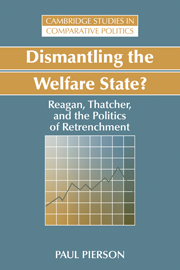Book contents
- Frontmatter
- Contents
- Acknowledgments
- Introduction: conservatives and the welfare state
- Part I Analytical foundations
- Part II The politics of programmatic retrenchment
- 3 Retrenchment in a core sector: old-age pensions
- 4 Retrenchment in a vulnerable sector: housing policy
- 5 Retrenchment in a residualized sector: income-support policy
- Part III The embattled welfare state
- Notes
- Index
5 - Retrenchment in a residualized sector: income-support policy
Published online by Cambridge University Press: 05 June 2012
- Frontmatter
- Contents
- Acknowledgments
- Introduction: conservatives and the welfare state
- Part I Analytical foundations
- Part II The politics of programmatic retrenchment
- 3 Retrenchment in a core sector: old-age pensions
- 4 Retrenchment in a vulnerable sector: housing policy
- 5 Retrenchment in a residualized sector: income-support policy
- Part III The embattled welfare state
- Notes
- Index
Summary
No area of the welfare state has provoked such persistent controversy as have programs providing income support for the able-bodied poor. The controversy stems largely from these programs' interference with what is both a strong cultural expectation and a fundamental aspect of market-oriented economies: that whenever possible, potential workers should support themselves by earning a wage. Disputes over income-maintenance programs are usually regarded as highly partisan. Conservatives, given their preferences for minimizing government intervention and their sensitivity to employers' interests, have criticized income-maintenance initiatives. Liberals, with union support, have been less reluctant to weaken the dependence of the able-bodied on a steady job to avoid impoverishment.
Given these partisan differences, and the vigorous rhetorical attacks of British and American conservatives on existing income-support policies, the Reagan and Thatcher administrations were expected to produce radical reforms. Early analyses often argued that they were succeeding. Indeed, the 1980s turned out to be a brutal decade for the poor. High unemployment and mounting international competition weakened the labor market for those with limited skills. In Britain, the number of households living on less than half the average income (a common international measure of poverty) more than doubled between 1979 and 1987, rising from 9 percent to 19 percent. In the United States, the poverty rate was 13 percent in 1980 and 13.5 percent in 1990, but was substantially higher for most of the decade, peaking at 15.2 percent in 1983. Although the position of the poor worsened both as a consequence of economic change and government policy, retrenchment in income-maintenance programs made only a limited contribution to this.
- Type
- Chapter
- Information
- Dismantling the Welfare State?Reagan, Thatcher and the Politics of Retrenchment, pp. 100 - 128Publisher: Cambridge University PressPrint publication year: 1994



